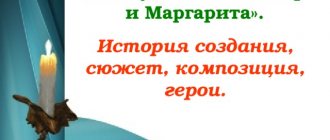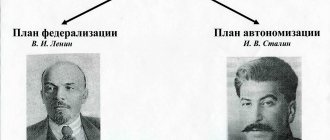Essay on a linguistic topic 9th grade presentation
Step-by-step instructions for writing an essay. Step 1. Getting to know the statement Carefully read the statement about language. Think about it. Highlight your keywords. Find out what properties of language, what linguistic phenomena are being discussed in the statement. Sample answers about the richness, expressiveness, and accuracy of Russian speech; about the means of expressing thoughts; about the role of epithets, metaphors, personifications, comparisons, synonyms, antonyms, phraseological units, etc.; about the relationship between vocabulary and grammar; about the role of syntax in human communication; about the flexibility of the Russian punctuation system and the functions of punctuation marks, etc. Step 3. Formalize the introduction In the introduction you must: formulate the position of the author of the statement; express your attitude towards it Words and expressions will help you formulate the author’s position: To express your attitude towards the author’s position, you can use the following words really really can’t help but agree with the author of the statement I completely agree with ... I have to agree with ... I share the author’s point of view statements I support the author’s opinion, it is indisputable that the author’s opinion is that ... Remember that the introduction should consist of approximately 2-3 sentences. You can use quotation, for example: K.G. Paustovsky said: “There is nothing in life and in our consciousness that cannot be conveyed in the Russian word.” Indeed, words most accurately, clearly and figuratively express the most complex thoughts and feelings of people, the entire diversity of the surrounding world. You can do without quoting, for example: Language is one of the miracles with which people convey the subtlest shades of thoughts. The great Russian writer K. Paustovsky argued that the Russian word can not only name objects, phenomena and actions, but also express ideas, thoughts, feelings. I cannot but agree with the opinion of the author of the statement or: I understand the statement of K. G. Paustovsky this way: there is no object in the universe for which man has not come up with a word. With the help of words we name not only objects, but also every action and state. The Russian word is especially rich in denoting phenomena. I share the point of view of the Russian writer. or: In the statement of K. G. Paustovsky, my attention was attracted by the idea that in the rich Russian language one can find words to express the entire diversity of the surrounding world and the inner world of man. Step 4. Write the main part The main part can be started with the following words Let's take a closer look at the words in the text ... (we say the last name of the author of the text) Let's turn to the text of the Russian writer ... (last name of the author of the text) Let's prove this idea using examples from the text ... Let's try to reveal the meaning of the thesis using examples taken from the text... Below are examples that confirm the words of the writer and your reasoning. Carefully study the criteria for evaluating example arguments: there should be 2 examples; examples must be from the specified text; When giving an example, you need not only to name a linguistic phenomenon, but also to explain its meaning and indicate its role in the text. When formatting examples, you can use introductory words “firstly”, “secondly”, etc. Remember that they are separated by a comma. In the final part of the essay, a conclusion is drawn from everything that has been said. As a rule, the conclusion says the same thing as the introduction, but in different words. You can begin your conclusion with the following words and phrases: Thus, ... So, ... Therefore, ... As a result, you can come to the following conclusion: ... In conclusion, we can say that ... We are convinced that ... Summarizing what has been said, ... It follows from this that … etc. For example: Thus, the above examples confirm the idea of K.G. Paustovsky that in the Russian language you can find the necessary words to express the most complex thoughts and various shades of feelings. or: To summarize what has been said, I would like to note that epithets play an important role in a literary text: they contribute to a more complete, accurate, vivid and imaginative transmission of shades of thoughts, feelings and assessments of the author of the text. General plan: 1. Thesis (we formulate the author’s position and express our attitude towards it). 2. Argumentation: a) argument-example No. 1; b) example argument No. 2. 3. Conclusion. We start each part with a red line, that is, your essay must have at least 3 paragraphs. And 4 is better, because... The 2nd part can be divided into 2 paragraphs in accordance with the number of example arguments. !Points are deducted for missing paragraphs. Step 5. Write a conclusion. I cannot but agree with the statement of K. Paustovsky, who dedicated these lines to our native language: “There is nothing in life and in our consciousness that cannot be conveyed in the Russian word.” Indeed, the Russian language is one of the most developed and richest languages in the world. What is his wealth? The richness of any language is determined primarily by the richness of its vocabulary. Famous Russian scientist V.I. Dahl included more than 200 thousand words in the “Dictionary of the Living Great Russian Language”. An important source of speech enrichment is synonymy. Our language is very rich in synonyms - words that have a common meaning and differ in additional shades or stylistic coloring. Synonyms attract the writer or speaker because they allow one to express a thought with extreme precision. Thus, when describing Anna Fedotovna’s feelings, the author uses the synonyms “bitterness and resentment” (sentence No. 44), “the conversation worried, surprised, offended” (sentence No. 33), which help the writer more fully and multifacetedly reveal the mental state of his heroine. The Russian language also has rich word-formation capabilities. The ways of forming words in the Russian language are very diverse. One of the most productive ways is suffixal. Take, for example, the word “Tanechka” from sentence 1. It is formed using the diminutive suffix -echk-, which helps the author express sympathy for the heroine of his work. Thus, the Russian word can not only name objects, phenomena and actions, but also express feelings.







